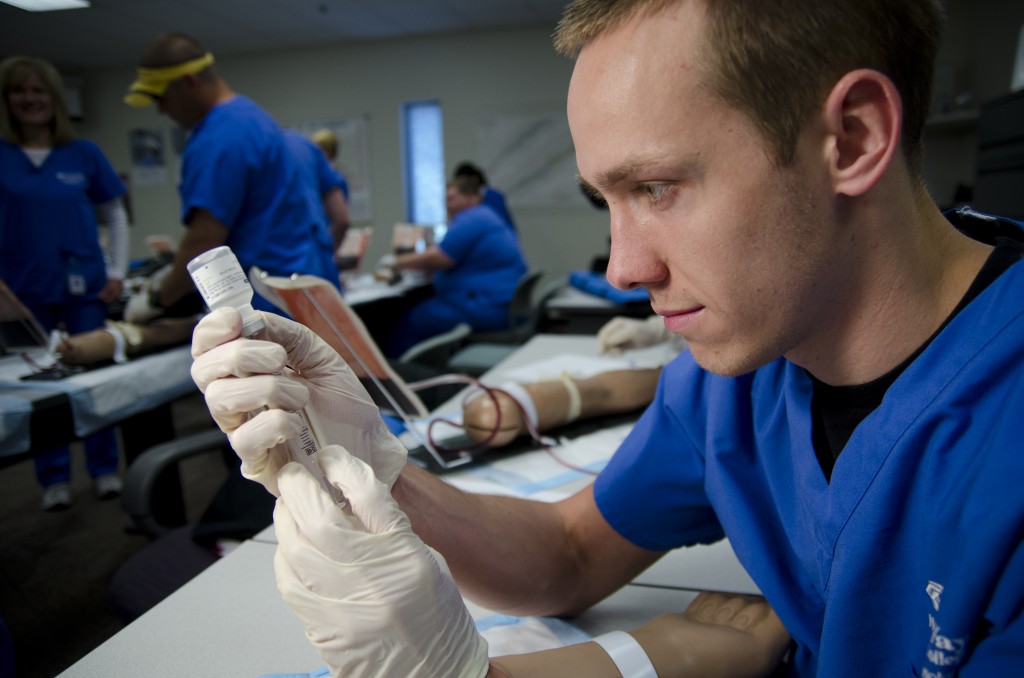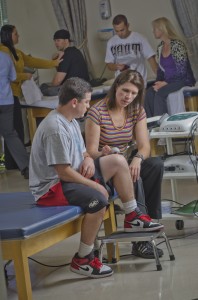This blog series provides readers with insight on the valuable content that is being shared at the NASDCTEc Fall Meeting. Guest bloggers are partner organizations, supporters and other experts that will be present at the national gathering in the Baltimore, MD area October 21-23, 2013. Today’s guest blogger is Cullen White, Cisco Academy Instructor at Fairmont Heights High School in Washington, DC.
“Does this class count as an Advanced Placement course?”
It’s been a common question of my returning IT Academy students. My courses are demanding. I expect them to read and write daily, to meet online after school for concept and skills reviews, and to practice using skills that will help them in college and career. They view my Cisco Networking Academy and computer science courses as college-level, and want others to view them that way too (in addition to the grade inflation that accompanies AP courses). Unfortunately, the courses that I teach aren’t a part of the core curriculum. Instead, they’re seen by many as electives and therefore expendable. 
They shouldn’t be.
My classes offer too much opportunity for academic and professional growth to be viewed that way. The things we explore together are far too interesting, too important. In one class, we’re learning how data moves from device to device, and how to build our own networks. In another, we’re building Web apps while learning how to obtain feedback from users and analyze data. There is never a dull moment. Students are constantly engaged by the meaningful, hands-on experiences that my classroom provides. Why wouldn’t they be? They know that what we learn matters, because my courses mimic the same online, tech-enabled world that they grew up in. What we do is immediately relevant to them.
There is no reason for computer science or system engineering courses to be ranked as “non-essential” in favor of more traditional English, math, and science courses that so often teach knowledge and skills out of context. Especially when the very same knowledge and skills can be taught — when they ARE taught — in technology classrooms like mine. It’s time to start thinking about how we can change the core of our education system to meet the demands of a rapidly evolving, tech-savvy world. It’s time to move computing education classes to the core. And it’s time to save our students from the same class schedules that bored us to death.
This is important. If we don’t make technology education a priority, we will face a crisis of epic proportions. It is estimated that by 2020 there will be 4.2 million jobs in IT and computing. There is no way we can fill those jobs with American students and an education system that doesn’t adequately prepare them. Reframing computing education courses as a part of the core curriculum is an important and necessary step in ensuring that our students can meet the challenges of an ever-changing global economy.
Making technology education a part of the core won’t be easy. There is, however, a logical way to proceed:
1. Educate Decision-Makers at Local Levels
I’ve been fortunate to work with school and district administrators who support my students and me as much as they possibly can. Still, I question whether admins truly understand how exceptionally important technology education is for our students, community, and nation. It’s not surprising either, given how challenging it is to understand major networking or computer science concepts when you haven’t been in the industry. Helping local leaders understand and gaining their support is key in making necessary changes. Here is where industry giants have a responsibility to get involved as well.
2. Change the Way Students View Technology Education
Above all, we have to increase the value of technology education in the eyes of students. They need to understand what opportunities they will have by pursuing higher learning in computer science or network administration. Districts need to work with instructors to develop multi-year technology education programs, then aggressively recruit students for them. Outreach through social media will be exceptionally important, but nothing is more so than making sure students have good teachers. At the very least, we need to make sure that technology education courses count as graduation requirements.
3. Raise Expectations for Technology Education Teachers
We have to develop clear and specific certification pathways for technology education teachers. As it stands, a number of states don’t have certification processes for educators in computing-related fields. This leads to confusion and permits low expectations for teachers. Our students and teachers deserve better.
4. Encourage Technology Instructors to Adopt and Integrate the Common Core State Standards (CCSS) for Literacy and Math
Core classes, English and math specifically, have been favored in the implementation of the CCSS for obvious reasons. Technology education classrooms are uniquely positioned, however, to integrate both English and math standards in a meaningful way. So much of what is done in computer science and systems engineering already requires the application of fundamental mathematics. Integration of the English language arts standards should be natural, given the need to explain solutions to complex technical problems through writing and speech.
Additionally, it is our classrooms that can lead directly to careers. Embedding the standards will further allow us to demonstrate that we are truly preparing our students for college and/or career, especially if they are linked to professional-level certification.
Finally, successful integration of literacy and math standards will help prove that our classrooms belong with other core subject areas.
5. Allow districts to develop pathways of study that work for their students and teachers.
As mentioned previously, districts have to create K-12 course pathways that ensure students are continually exposed to technology-related concepts. Allowing districts to pick their flavor of technology education allows them to play to the strengths of their staff and better meet the needs of their students and communities. Additionally, the demand for certain tech-related roles differs by region. This is exceptionally important to consider in low-income communities, as success in the right tech education courses can quickly provide opportunities for upward social mobility to students and their families.
Let’s face it: The next life-changing app isn’t going to come out of English class, unless the students have already learned how to program. Our reliance on technology is here to stay. There is no doubt that we have to rethink our current model of education. And not just for the next 10 years either. We have to build a model that is agile and ready to adapt. We have to build a model with technology at the core.
To learn more about Cisco Networking Academy courses available at high schools, colleges and universities across the country, visit www.cisco.com/go/netacad/us
The NASDCTEc Fall Meeting will be held October 21-23, 2013 at the BWI Airport Marriott Hotel in Linthicum, MD. More information
Ramona Schescke, Member Services Manager

 Featuring state of the art academic and technical programs, GateWay Community College’s student staffed community clinic will be on full display during the Achieving Excellence Institute.
Featuring state of the art academic and technical programs, GateWay Community College’s student staffed community clinic will be on full display during the Achieving Excellence Institute.





